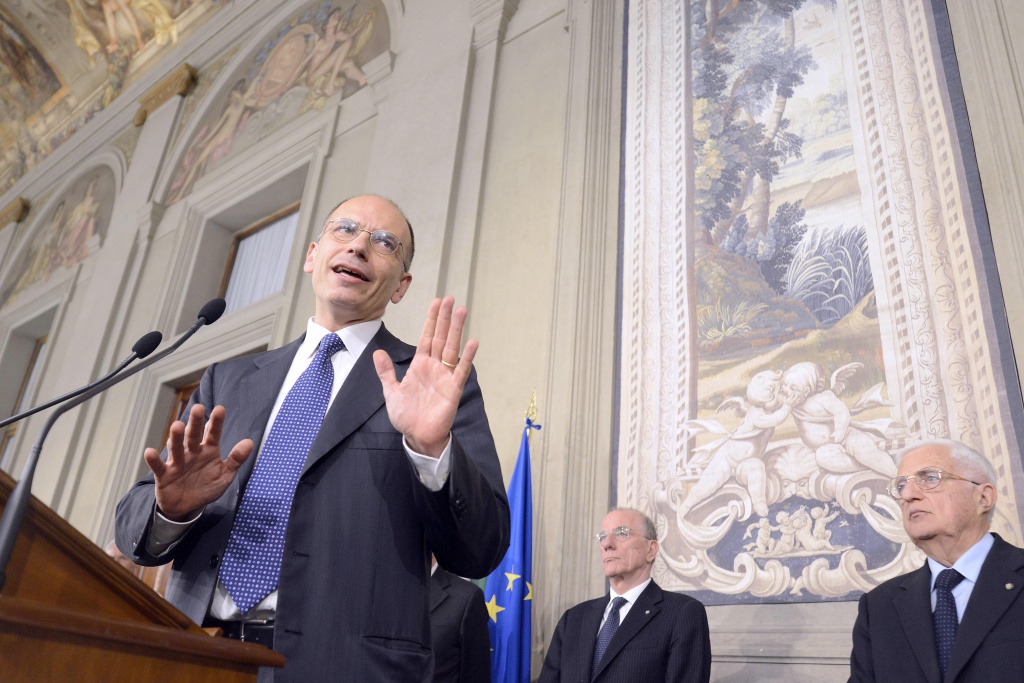Enrico Letta (age 46) is the youngest face of Italy’s old politics. A centrist within the Democratic Party (Pd), he is likely to put together a coalition government with the parties of Silvio Berlusconi (age 76) and Mario Monti (age 70), under the close direction of Italy’s newly re-elected president Giorgio Napolitano (age 87).
His strengths include the close connections he has carefully built with the most powerful players, both internationally – the US government, the EU, international finance, the Trilateral Commission, etc. – and at home – Italian business and banks, the Vatican, the political and media élite (details are provided by Alessandro Giglioli and Luca Sappino on the website of Italy’s weekly l’Espresso http://gilioli.blogautore.espresso.repubblica.it/2013/04/24/perche-hanno-scelto-il-giovane-enrico/).
This includes family connections; Gianni Letta (age 78), uncle of Enrico, has been for decades the most skillful and sensible political advisor to Silvio Berlusconi, serving as Minister in his governments.
His fundamental weakness is the impossible task he faces; building a coalition government between the right (Pdl) and centre-left (Pd) who have opposed each other in the starkest terms during the election campaign (the vote was held on February 24-25, 2013). Both parties had supported for a year and a half the “technical” government of Mario Monti (who ended up forming his own centrist party, getting only 11% of the votes) and have deeply suffered from the forced partnership imposed – at the peak of Italy’s financial crisis – by president Napolitano. The loss of credibility of the two major parties led to the unexpected success of the populist Five Star Movement of former comedian Beppe Grillo (25% of the votes).
In Rome, contrasts are already emerging about the names of potential Ministers, with widespread reservations about the inclusion of high profile politicians of either party. A key policy priority –forced upon the next government by president Napolitano – will be the reform of Berlusconi’s tailor-made but unworkable election system. The economic emergency is equally important – GDP may fall by 1.5% in 2013, after a 2.4% fall in 2012; industrial output is 25% below pre-crisis levels – but no strategy exist, beside compliance to Europe’s directions. The Letta government will have to include friends and foes of austerity, tax-cutters and neo-Keynesians, wage-cutting business and job-defending unions – an extremely unlikely mix with no clear direction and no guarantee for stability. The Prime Minister’s only point will be that his government will be better than no government at all in the midst of Italy’s social emergency.
Enrico Letta has long been a supporter of Europe’s austerity agenda – and of its implementation by Mario Monti’s previous government. He understands that some correction has now to be introduced, but it would be naïve to expect any significant change on the economic front.
Will the Letta government face any opposition? Fortunately – and differently from Monti’s government – yes. The Five Star Movement is noisy but ineffective in denouncing such a unholy union. More interestingly, SEL (Left, ecology, freedom) – the small party (3% of the votes) led by openly gay politician Nichi Vendola – after the election of Napolitano and the prospect of a coalition with Berlusconi has broken its alliance with the Democratic Party. Such decisions have opened up dramatic divisions within the Democratic Party itself; the unpalatable policies that are down the road may deepen them. A political realignment may emerge in the near future, leading perhaps to something closer to a European-style left/socialdemocratic party.
In the meantime, Enrico Letta may well go the way of the Greek government coalition; a collapse of politics and democracy in front of economic decline and social turmoil in the battered periphery of Europe.
Mario Pianta is Professor of Economic Policy at the University of Urbino and is a member of the Centro Linceo Interdisciplinare of the Accademia Nazionale dei Lincei. His last book is “Sbilanciamo l’economia. Una via d’uscita dalla crisi” (“Off balance. A way out of the crisis”) co-authored with Giulio Marcon (Laterza, 2013, www.novesudieci.org).
Article for OpenDemocracy

